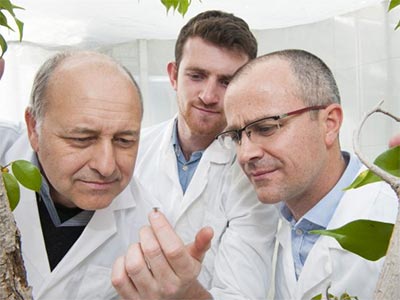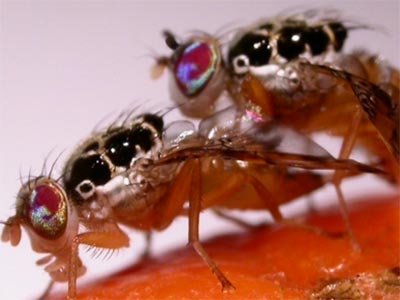Imported fly performs in mating trials
20 December 2016

An imported fruit fly from the United Kingdom (UK) has shown great potential to biologically control the damaging horticultural pest Mediterranean fruit fly (Medfly), following a series of glasshouse trials in Western Australia.
Research jointly funded by the WA Department of Agriculture and Food and Horticulture Innovation Australia has tested the fly’s mating performance and found it stacks up against current control techniques using sterile radiation-treated flies.
The department sourced the new Medfly strain from UK-based company Oxitec and reared a colony of 2400 flies at a specialised facility in South Perth.
WA DAF horticulture director David Windsor said the research was examining whether the Oxitec fly offered an improved option for industry to control Medfly, which costs the State producers millions of dollars each year.
Dr Windsor said the Oxitec technology, like the sterile insect technique, aimed to break the breeding cycle of the Medfly through the rearing and release of the control flies.
Instead of using radiation to sterilise the male flies for release, the Oxitec fly has been developed to include a self-limiting gene which shortens the lifespan of female flies.
“When the male flies mate, they pass on the self-limiting gene to their offspring which causes females to die before reaching adulthood so they cannot breed,” Dr Windsor said.
Scientists from the department and Oxitec undertook glasshouse studies comparing the performance of the Oxitec flies against the sterile flies.
Replicates were run with 21 mating trials in total under strict regulatory conditions.
“These involved releasing either Oxitec or sterile male flies, competing with wild male flies, to mate with females, in glasshouse trials,” Dr Windsor said.
 “During the trials each mating pair was collected and checked to determine the male’s genotype.”
“During the trials each mating pair was collected and checked to determine the male’s genotype.”
The mating performance by Oxitec males was comparable with that of sterile males irradiated at low levels, and exceeded that of sterile males treated with a higher dose of radiation which is used to provide a better guarantee of sterility.
“The research found the Oxitec male flies are compatible with wild female flies, and their mating performance is promising,” Dr Windsor said.
“We now need to consider how the new strain will perform under field conditions.”
Dr Windsor said the department was now in consultation with Australian Government regulatory bodies including the Office of the Gene Technology Regulator for the next phase of testing.
Horticulture Innovation Australia Chief Executive Officer John Lloyd said Horticulture Innovation Australia is a strong supporter of evidence-based research that can add to the growers’ control options.
More information about the trial is available from the department website.
Article reproduced from Horticulture Innovation Australia